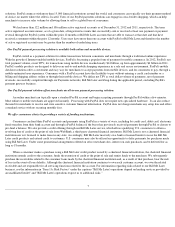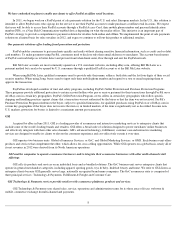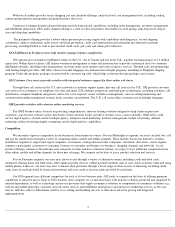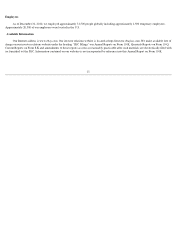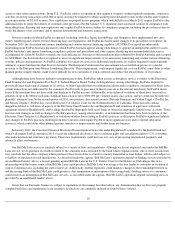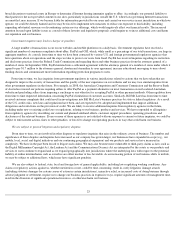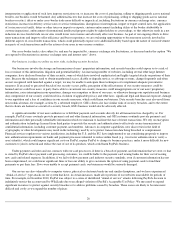eBay 2012 Annual Report Download - page 19
Download and view the complete annual report
Please find page 19 of the 2012 eBay annual report below. You can navigate through the pages in the report by either clicking on the pages listed below, or by using the keyword search tool below to find specific information within the annual report.
In 2012, PayPal's California regulator, the California Department of Financial Institutions (DFI), notified PayPal that PayPal's practice of
holding the funds underlying U.S. customer balances as an agent on behalf of its customers, rather than as owner of those funds, meant that
PayPal could not treat those funds as liquid assets for purposes of the liquidity rules applicable to California money transmitter licensees. Based
on change to our U.S. PayPal user agreement effective November 1, 2012, PayPal began holding U.S. customer balances as direct claims against
PayPal, rather than as an agent or custodian on behalf of such PayPal customers. As a result, effective November 1, 2012, all U.S. PayPal
customer balances, which were previously reported as off-balance sheet, have been reflected as assets in our consolidated balance sheet under
"Funds receivable and customer accounts," with an associated liability under "Funds payable and amounts due to customers." In addition, this
change disqualified the customer balances from pass-through FDIC insurance and resulted in U.S. PayPal customers becoming general creditors
of PayPal with respect to such customer balances. This change could also result in decreased revenue to PayPal if it decides to shift the funds
from interest-bearing deposit accounts to securities that bear lower interest rates or non-interest bearing deposit accounts. For additional
information, please see “Part II - Item 7: Management's Discussion and Analysis of Financial Condition and Results of Operations” under the
caption “Off-Balance Sheet Arrangements,” below.
In markets other than the U.S., the EU, Australia, the China domestic business and Brazil, PayPal serves its customers through PayPal
Private Ltd., a wholly-owned subsidiary of PayPal that is based in Singapore. PayPal Private Ltd. is regulated in Singapore as a stored value
issuer. In many of these markets, it is not clear whether PayPal's Singapore-
based service is subject only to Singaporean law or, if it were subject
to local laws, whether such local law would require a payment processor like PayPal to be licensed as a bank or financial institution or otherwise.
In such markets, the business may rely on partnerships with local banks to process payments and conduct foreign exchange in local currency.
Local regulators who do not have direct jurisdiction over Singapore-based PayPal Private Ltd. may use their local regulatory power to slow or
halt payments to local merchants conducted through the local banking partner. Such regulatory actions impacting local banking partner
arrangements could impose substantial costs and involve considerable delay to the provision or development of PayPal services in that market,
or could prevent PayPal from providing any services in a given market. For example, in January 2010, the Reserve Bank of India directed the
Indian affiliate of PayPal's processing bank to suspend withdrawals to the Indian bank accounts of PayPal customers for both personal and
business customers for a period of time. As a result, PayPal ended personal non-commercial payments to and from Indian accounts and the
ability of Indian sellers to spend payments they receive, and also stopped offering certain commercial payments between Indian buyers and
Indian sellers. In November 2010, the Reserve Bank of India issued guidelines to Indian banks on the requirements for processing export-related
transactions for online payment gateway service providers such as PayPal, including a limitation on the amount of individual transactions to no
more than $500 (increased in October 2011 to $3,000). The Reserve Bank recently approved an application by PayPal's bank in India which
would permit PayPal to process domestic Indian transactions, subject to a number of conditions. The Reserve Bank may again impose a
suspension if it is not satisfied with PayPal's and its partner bank's actions to comply with these guidelines. In the event of any non-compliance,
PayPal could be subject to fines from the Reserve Bank, and PayPal's prospects for future business in India, both cross-border and domestic,
could be materially and adversely affected.
Even if PayPal is not currently required to be licensed in some jurisdictions, future localization or targeted marketing of PayPal's service or
expansion of the financial products offered by PayPal (whether alone, through a commercial alliance or through an acquisition) in those
countries could subject PayPal to additional licensure requirements, laws and regulations and increased regulatory scrutiny, which may harm
PayPal's business. For example, PayPal will be required to obtain a license in Russia to expand its services there, and has applied for such a
license. Even if PayPal does not expand its services in the countries it serves, changes in the laws of those countries could also require us to
obtain new licenses or submit new registrations. For example, PayPal has recently submitted applications for licenses in Hong Kong and in the
Canadian province of Quebec. There can be no assurance that PayPal will be able to obtain such licenses. Even if PayPal were able to obtain
such licenses. There are substantial costs involved in maintaining such licenses, and PayPal would be subject to fines or other enforcement action
if it violates disclosure, reporting, anti-money laundering, capitalization, corporate governance or other requirements of such licenses. These
factors could impose substantial additional costs and involve considerable delay to the provision or development of PayPal's products. Delay or
failure to receive such a license or regulatory approval could require PayPal to change its business practices or features in ways that would
adversely affect PayPal's expansion plans or force PayPal to suspend providing products and services to customers in one or more countries.
Several other countries (for example, Turkey and Hong Kong) are also contemplating introducing e-payments laws and licensing regimes that
would be applicable to PayPal's business.
PayPal is also subject to various anti-money laundering and counter-
terrorist financing laws and regulations around the world that prohibit,
among other things, its involvement in transferring the proceeds of criminal activities. PayPal is focused on compliance with these laws and
regulations and has programs designed to comply with new and existing legal and regulatory requirements. However, any errors, failures or
delays in complying with federal, state or foreign anti-money laundering and counter-terrorist financing laws could result in significant criminal
and civil lawsuits, penalties and forfeiture of significant
17


